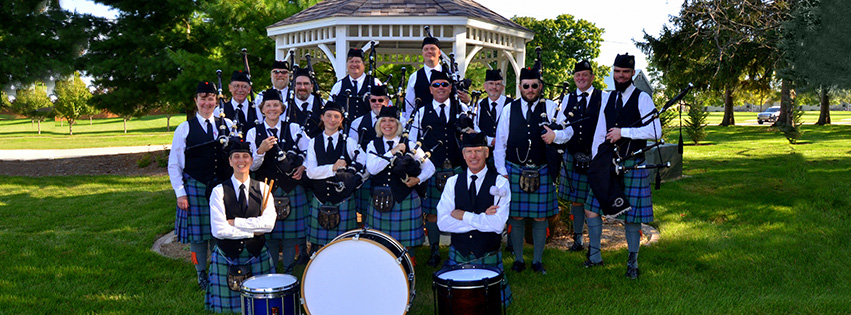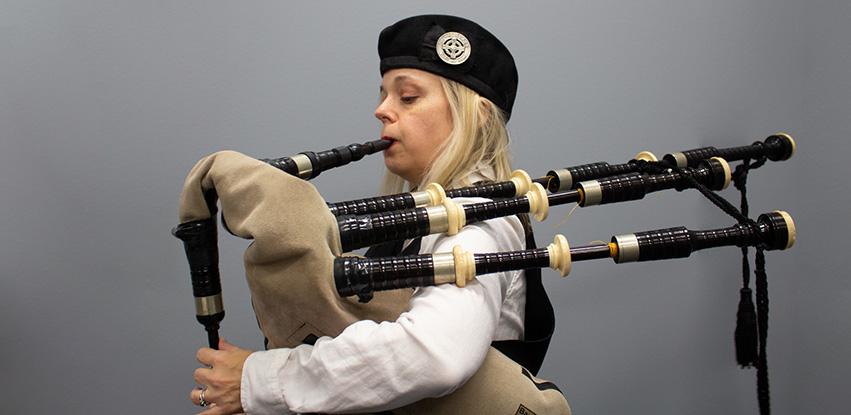
I was eleven when I heard the call. My grandparents had just moved to Morton, and on certain evenings, haunting music would spill into the streets. I couldn’t keep myself from wandering in pursuit of this enchanting sound, though I didn’t find it at the time. Little did I realize that the bagpipes had called me. Much later, I would answer the call (to the delight of some in my family and the eternal regret of others).
What I heard as a child were the bagpipes and drums of the Morton Highlanders. Originally founded as The Peoria Pipe Band in 1963 by Scotsman Tommy Livingstone and three students, the band had changed towns, renamed itself and grown beyond its original four members. Around 1994, the band changed its name again to Celtic Cross Pipes and Drums—and they still exist today, though their practice location has moved to Eureka.
Make of a Piper
The sound of the bagpipes never left me. After watching Celtic Cross Pipes and Drums perform in the Morton Pumpkin Festival Parade, I was hooked (again). Celtic Cross is not only a hometown favorite; they’re the only pipe band between Springfield and Chicago. In August 2015, I reached out for the free instruction listed on their website and set myself a challenge.
The bagpipes consist of a bag, three drones (the “sticky-up” bits) and one chanter. It’s a four-reed instrument that requires outstanding lung capacity, coupled with fast fingers. All music must be memorized. As 19th-century writer Neil Munro noted, “To the make of a piper goes seven years of his own learning and seven generations before. At the end of his seven years, one born to it will stand at the start of knowledge.” I’ve been playing the bagpipes since the summer of 2016, so that puts me at -3 on the start of knowledge. I try not to sound like it!

To train my fingers for piping, I started on a subset of the instrument called the chanter. On its own, it looks like a grade school recorder, but the complexity and speed of pipe music involves a mighty honking and squeaking from beginners. If you suspect your neighbor tortures geese in her basement, ask if she just took up the bagpipe chanter. If she says no, look for feathers.
With the chanter tamed, I was ready for my first set of bagpipes. New pipes run between $1,500 and $2,000, while used pipes, varying in price, are handed down from previous pipers. I chose to buy my 1987 Campbell & Grainger pipes from retiring piper Tom Woodhouse. From one piper to another: that’s how the bagpipes call and often, how they come to you.
Celtic Cross Pride
After some months of lessons, I joined the Celtic Cross “piping circle.” At our practices, that’s what we do: stand in a circle and play tunes on Thursday nights. Do we need earplugs for that? We certainly do, if only to block the terrible puns traded by members between songs. Pipe Major Luke Stremlau leads the pipers, while drummers follow the pace of Drum Sergeant Andrew Lockwood. (He and our Pipe Sergeant Kevin Nickerson are two of the Morton Highlanders whose music drew me in long ago.)
I didn’t just get my kilt when I started to play with Celtic Cross. I had to earn it, demonstrating that I played the repertoire well enough to march with the band in parades. The night I earned my kilt was one of the highlights of my life, and I first wore it in the St. Patrick’s Day Parade of 2017. Our kilt tartan is named the “Flower of Scotland” and comes with the rest of the band uniform: a glengarry (black hat with bobble), white shirt, black vest, black tie, piping hose, flashes (orange ribbons) and ghillie brogues (shoes). We sweat in summer, shiver in winter, and wear it with fierce pride, always.
We march in parades, serenade the veterans at Honor Flights, compete in piping competitions as soloists and as a band (five times as Grade V Champion Supreme), and play for weddings, funerals and other occasions. When someone asks why I play the pipes, I answer: because they called me to such wonders. The bagpipes—and through them, Celtic Cross Pipes and Drums—have brought me captivating sounds, warm friends, good fun and hard work.
We can always use more bagpipers and drummers in Celtic Cross. The next time we march past you in a parade or play for you at an event, listen carefully. We’re calling you, too. Join us. PM
For more information, visit celtic-cross.org.
- Log in to post comments

